Away for Conference Travel
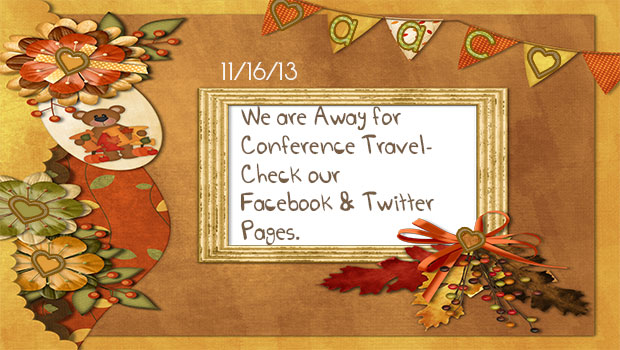
We are away at the 2013 ASHA convention in Chicago. Check our Facebook and twitter pages for updates.

We are away at the 2013 ASHA convention in Chicago. Check our Facebook and twitter pages for updates.
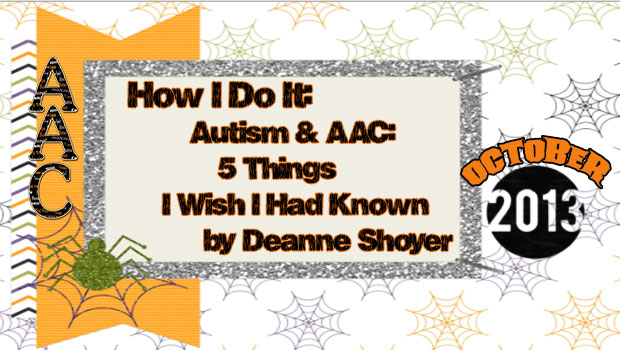
We are so pleased to have connected with Deanne Shoyer from Small But Kinda Mighty and even happier that she is our guest blogger today. Deanne is a mom of twin boys who both are on the autism spectrum. Deanne successfully fundraised to buy iPads for her boys and has been active for more than 3 years in social media and in the special needs app community. She has written about many things but often focuses on implementing AAC in a very PrAACtical way. Please feel free to share this very important post as she highlights AAC, what she has learned, and how it may help others. by Deanne Shoyer at Small But Kinda Mighty (original post at Small But Kinda Mighty) In the title of this post I’ve linked autism and AAC for a specific reason. A lot of the points here are equally applicable to people who have a... [Read More...]
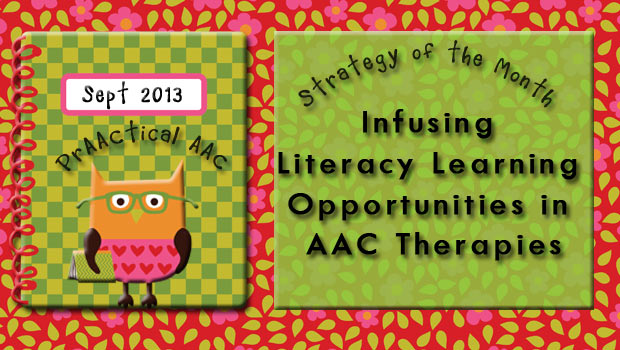
Most of our conversations with SLPs about teaching literacy to individuals with AAC needs revolve around the ‘How’s.” “How can I possibly teach reading and writing? I don’t have enough time with her to teach language and communication!” “How am I going to teach reading to someone who can’t sound out words? Or writing to someone who can barely use a pencil or keyboard?” In general, SLPs WANT to teach literacy skills. They understand the importance of this skill set and how it can level the playing field for people with communication difficulties. They know that reading and writing are inherently linked to speaking and listening. They know that literacy is a powerful key that unlocks many, many doors. And yet, getting from there to the point of actually teaching clients with AAC needs to read and write is not something we do enough of. This month, we’ll look at ways... [Read More...]
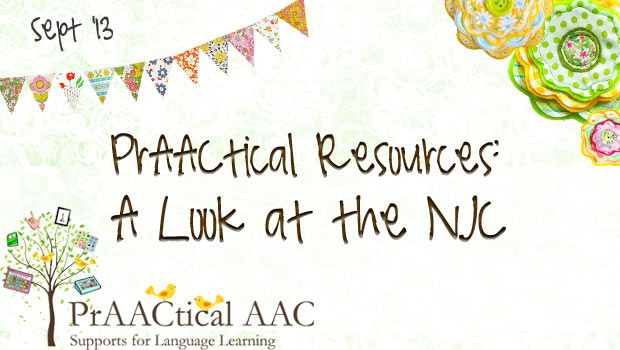
If you work with individuals with significant disabilities, chances are that you’ve had some questions from time to time. We wanted to be sure that everyone was aware of the resources of the National Joint Committee for the Communication Needs of Persons with Severe Disabilities, or the NJC, for short. The NJC is a consortium of professional organizations, such as ASHA, TASH, USSAAC, and ATAP. The NJC has been in existence since 1986 and offers a range of prAACtical resources on its website. 1. Communication Bill of Rights 2. Guidelines for Meeting the Communication Needs of Persons With Severe Disabilities including best practices for assessment, goal-setting, and intervention. 3. Qualifying people with significant disabilities for services 4. Frequently Asked Questions: Peruse these or send them your own and they will post the response.
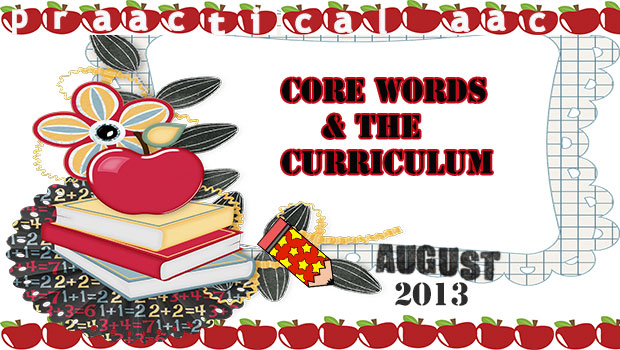
Core words can easily be incorporated into academic curriculum. There just needs to be systematic planning for core word vocabulary and then of course the joining of fringe words. One of the best visual explanations of core words is in the now ‘famous’ you tube video Language Stealers (HD). If you have not seen it, it is worth watching for many reasons but in the context of this post, it perfectly illustrates how you can teach about Greek and Roman history with core words. Planning for Core Words for the Classroom (& ALL School Activities) Have the core word communication board with you at ALL times– If you (SLP/Educator) have your core word communication board, you can model and teach the target core words during all lessons. A premise of this approach is that the student has access to their core word vocabulary display on a no-tech communication board or on their... [Read More...]
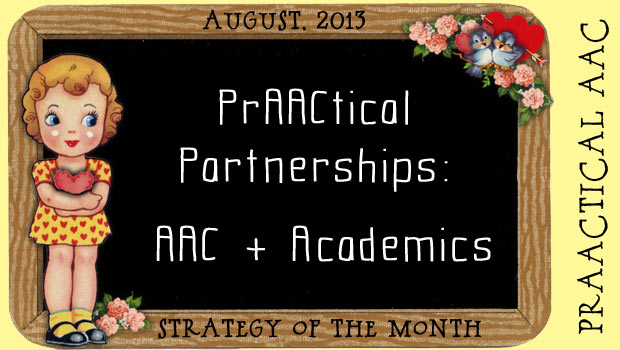
Like many of you, we are always racking our brains trying to help students who use AAC be successful academically. Because we serve these students in a clinical setting, we could easily pass on the opportunity to align our AAC goals with academic standards but what would be the fun in that? Here are some things we try to think about with school-aged kids who have AAC needs. SLP to SLP If it takes a village to raise a child, how many people does it take to help a kids with AAC needs to develop communicative competence and succeed academically? It boggles the mind. As SLPs, message is this: We have to work together. Many kids who use AAC have private therapies in addition to their school services, and yet, we rarely connect. We have to find a way to do a better job at this so that kids with... [Read More...]
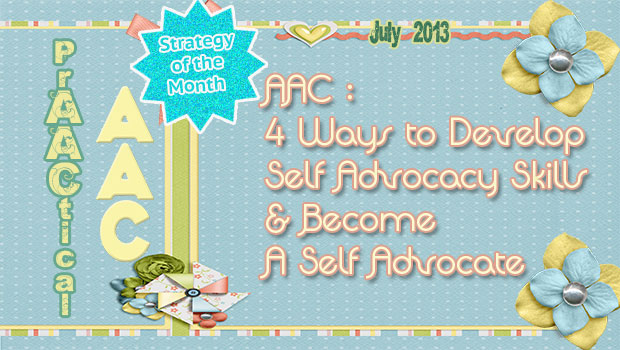
Self Advocacy comes in many shapes and forms for all learners. We all need to have a level of self advocacy skills to have a positive self-esteem, to continue a path of life long learning, and to defend and protect ourselves in situations that potentially can be harmful. The teaching of self advocacy begins with learning to request and protest but goes way beyond that for ALL learners. For those with AAC needs, specific strategies and direct instruction are often necessary to make self advocacy a comprehensive and robust skill. Self advocacy skills are a priority for older learners so for our Strategy of the Month, we will discuss some ways to help develop self advocacy skills beyond the requesting and protesting levels. We hope to build strong self advocacy skills for ALL learners. Rating Scales– Teach the use of rating scales to help AAC learners give their opinions on... [Read More...]
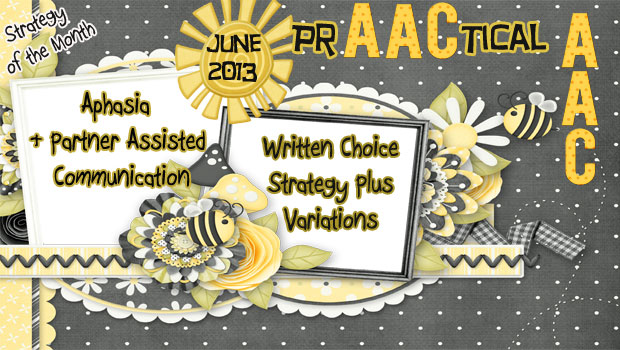
This month, we have enjoyed writing about communication strategies for aphasia. Partner supported communication is the platform for many of the effective techniques we use to help people with aphasia initiate, maintain, or terminate communication and conversation. We have talked about assessment strategies, communication books, and alphabet & topic supplementation. Now it is time to discuss the written choice strategy. The written choice strategy is fairly easy to implement, can look natural, and can result in seamless detailed conversation. Written choices are provided in the context of conversation and are displayed in an organized manner. What is It? The written choice strategy has the partner/facilitator generating written key-word choices that relate to the conversational topic. The written choices can be paired with text, pictures, drawings, symbols, and natural speech. The partner/facilitator writes possible answers to conversational questions in list form. The conversation is extended as continued written choices are offered... [Read More...]
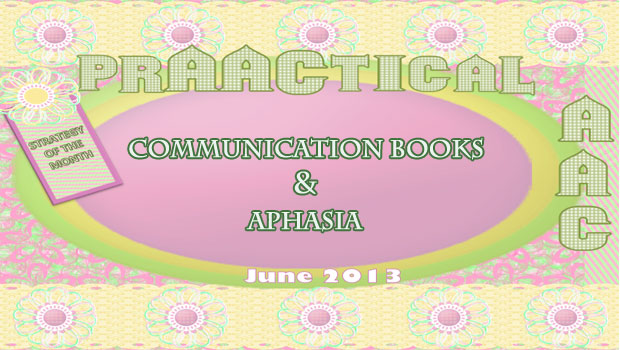
We know aphasia intervention has moved well beyond traditional speech and language training and intervention. We are so happy it has moved to an authentic participation, functional communication, and social interaction focus. Communication books are one tool for helping people with aphasia be active participants in conversation and comprehensive communication. Here are some thoughts and ideas about communication books to get started. Communication Books- Communication books for adults with aphasia can be in grid format with relevant communication messages. There can be a few pages or many, but keep in mind that the more pages, the longer it will take to navigate. It is most important to include high priority and relevant messages that will support needed communication and not just ‘standard’ messages. There are many samples and templates that can be purchased or downloaded for adult communication books. These may be good as a start, but should be individualized when... [Read More...]
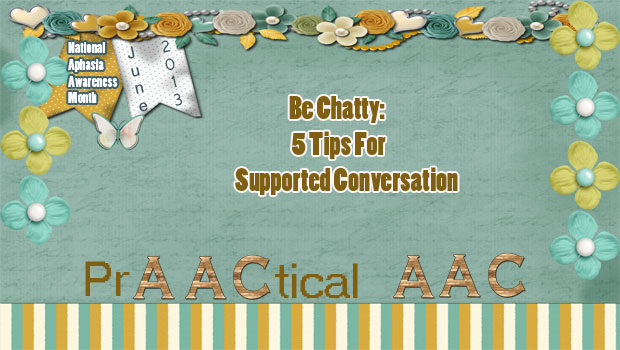
There are many strategies to support communication and conversation for individuals with significant aphasia. Conversation is about connecting with people. We engage in conversation about interesting and relevant experiences to help with connecting. To best connect and be part of conversation, there needs to be comprehension and expression from each communication partner. With aphasia, there is difficulty in these language areas, but it is not that language is lost, it is that it needs to be accessed differently. These quick start tips will support accessing conversation and connections. Write or Draw Key Words– When you are talking, write key words to support your spoken language. Gesture Key Words– When you are talking, supplement spoken language with gestures to illustrate a main point Show Related Photographs or Remnants– While you are talking, use photographs or some remnant of the an experience or event you are talking about. Written Choices to... [Read More...]